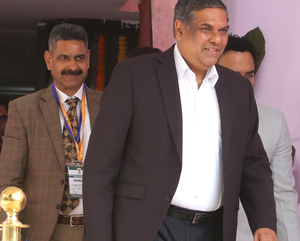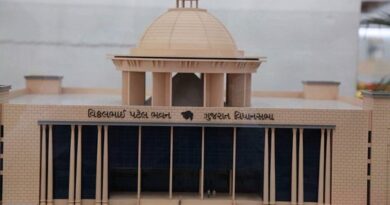Landmark verdicts delivered by CJI Sanjiv Khanna
New Delhi, May 13: Chief Justice of India (CJI) Sanjiv Khanna is set to demit the highest judicial office of the country on Tuesday on attaining the retirement age of 65 years.
He took oath as the 51th CJI on November 11 last year, with a tenure of around six months in office. After Justice Khanna’s retirement, Justice Gavai, presently the senior-most puisne judge of the apex court, will be sworn in as the 52nd CJI. In his over six-year-long stint at the Supreme Court, Justice Khanna pronounced certain landmark verdicts. He was a part of the landmark judgments on Article 370, decriminalisation of adultery, electoral bonds scheme, EVM-VVPAT tally case, etc.
Before his elevation to the top court, Justice Khanna served as a judge in the Delhi High Court till January 2019. Born in May 1960, he obtained his law degree from the Campus Law Centre, Delhi University. He enrolled as an advocate in the Bar Council of Delhi in 1983 and primarily practised taxation, arbitration, commercial law, environmental law, medical negligence law, and company law in the Delhi High Court. Here are the key decisions given by him as an apex court judge. Places of Worship Act: The CJI Khanna-led Special Bench, in an interim order passed on December 12, 2024, ordered that no fresh suits would be registered under the Places of Worship Act in the country, and in the pending cases, no final or effective orders would be passed till further orders.
The apex court was dealing with a clutch of petitions challenging the validity of certain provisions of the contentious law, which prohibits the filing of a lawsuit to reclaim a place of worship or seek a change in its character from what prevailed on August 15, 1947. Waqf Act: During the course of the hearing on a batch of petitions challenging the constitutionality of the Waqf (Amendment) Act, 2025, when the CJI Khanna-led Bench indicated passing of a stay order, the Union government assured the Supreme Court that it would not de-notify provisions related to ‘waqf by user’ or include non-Muslim members in the Waqf Board. Last week, CJI Khanna said that the Bench, also comprising Justices Sanjay Kumar and K.V. Viswanathan, did not intend to reserve its judgment at the interim stage in view of his impending retirement. It directed that the matter be listed before the Justice B.R. Gavai-led Bench for further hearing. BJP MP remarks on judiciary: A CJI Khanna-led Bench refrained from entertaining a Public Interest Litigation (PIL) seeking contempt of court action against BJP Lok Sabha member Nishikant Dubey over his remarks against the judiciary.
However, the Bench, also comprising Justice Sanjay Kumar, said that the comments were highly irresponsible and tend to scandalise and lower the authority of the Supreme Court, and had the tendency to interfere and obstruct the administration of justice. Amid ongoing hearings on the constitutionality of the Waqf (Amendment) Act, 2025, Nishikant Dubey, a Member of Parliament from Jharkhand’s Godda, during an interview, had said that “Chief Justice of India Sanjeev Khanna is responsible for all the civil wars happening in India” and “to provoke the religious war in this country, only and only the Supreme Court is responsible”. In its order, the CJI Khanna-led Bench stressed that any attempt to spread communal hatred or indulge in hate speech must be dealt with an iron hand. “Hate speech cannot be tolerated as it leads to loss of dignity and self-worth of the targeted group members, contributes to disharmony amongst groups, and erodes tolerance and open-mindedness, which is a must for a multi-cultural society committed to the idea of equality,” the apex court said, adding that any attempt to cause alienation or humiliation of the targeted group is a criminal offence and must be dealt with accordingly.
EVM-VVPAT tally verdict: A Bench headed by Justice Khanna had said that while it acknowledged the Fundamental Right of voters to ensure their vote is accurately recorded and counted, the same cannot be equated with the right to 100 per cent counting of VVPAT slips, or a right to physical access to the VVPAT slips, which the voter should be permitted to put in the drop box. The Bench, also comprising Justice Dipankar Datta, had said that giving physical access to VVPAT slips to voters is “problematic and impractical”, and will lead to misuse, malpractices, and disputes. The Supreme Court had rejected the submission to return to the ballot paper system as “foible and unsound”, adding that the weakness of the ballot paper system was well-known and documented. Interim bail to Arvind Kejriwal in ED case: In a judgment passed on July 12 last year, a Bench headed by Justice Khanna opined that former Delhi CM Arvind Kejriwal may be released on interim bail, given the fact that the Right to Life and Liberty is sacrosanct, and he has suffered incarceration of over 90 days.
The two-judge Bench, also comprising Justice Datta, referred to a larger Bench Kejriwal’s plea challenging his arrest and subsequent remand by the Enforcement Directorate (ED) in the liquor policy case for an authoritative pronouncement on the questions of law involved. Asked Kejriwal to mull stepping down as CM: In the same July 12 judgment of last year, the Justice Khanna-headed Bench had asked Kejriwal to take a call on stepping down from the CM’s post. “We are conscious that Arvind Kejriwal is an elected leader and the Chief Minister of Delhi, a post holding importance and influence. We have also referred to the allegations. While we do not give any direction, since we are doubtful whether the court can direct an elected leader to step down or not function as the Chief Minister or as a Minister, we leave it to Arvind Kejriwal to take a call,” it said. Referring Kejriwal’s plea against his arrest and subsequent remand in the money laundering case to a larger Bench, the two-judge Bench, also comprising Justice Datta, said: “Larger Bench, if deemed appropriate, can frame question(s) and decide the conditions that can be imposed by the court in such cases.” Interim bail to Kejriwal during Lok Sabha elections:
In view of the 2024 general polls, a Bench headed by Justice Khanna had ordered then CM Kejriwal to be released on 21-day interim bail in the money laundering case and had asked him to surrender on June 2. Imposing a slew of conditions, the Justice Khanna-led Bench asked Kejriwal to not visit his office or secretariat, while out on interim bail. It clarified that the grant of interim relief should not be treated as an expression of opinion on the merits of the case or the appeal pending before the apex court. As per the SC order, then CM Kejriwal was prevented from signing official files unless it was required and necessary for obtaining clearance/approval from the Lt Governor. The Bench, also comprising Justice Datta, said that it had passed a “very clear” order fixing the timeline of Kejriwal’s “release and surrender” and was not making any exception to anybody.
Electoral bonds scheme: In a unanimous verdict, CJI Chandrachud-headed Constitution Bench struck down the electoral bonds scheme saying that denying voters the right to know the details of funding of political parties would lead to a dichotomous situation and the funding of political parties cannot be treated differently from that of the candidates who contest elections. In his separate concurring opinion, Justice Khanna said that based on the analysis of the data, he arrived at the conclusion that the electoral bonds scheme failed to meet the balancing prong of the proportionality test. “However, I would like to reiterate that I have not applied proportionality stricto sensu due to the limited availability of data and evidence,” he said. His opinion contained the data as available on the website of the Election Commission (EC) and the data submitted by the petitioners. However, Justice Khanna clarified that the court had not opened the sealed envelope given by the EC. Further, he observed that the majority of contributions through bonds have gone to political parties which are ruling parties in the Centre and the states. Article 370: A five-judge Constitution Bench, also comprising Justice Khanna, had upheld the revocation of Article 370. In a concurring opinion, Justice Khanna said, “Article 370 was enacted as a transitional provision and did not have a permanent character. The abrogation of Article 370 does not negate the federal structure, as the citizens living in Jammu and Kashmir do and will enjoy the same status and rights as given to citizens residing in other parts of the country.”
The Constitution Bench, headed by then CJI Chandrachud, had ordered the Election Commission to take steps to conduct elections to the Jammu and Kashmir Assembly by September 30, 2024, and said that “restoration of statehood shall take place at the earliest and as soon as possible”. It had left open the question of whether the Parliament can extinguish the character of statehood by converting a state into one or more Union Territories, relying on the statement made by Solicitor General Tushar Mehta that statehood would be restored to Jammu and Kashmir. In May 2024, the apex court refused to review the Constitution Bench verdict and dismissed a batch of review pleas filed against its decision.



